When you try to update or install a particular piece of software on your Windows 11 or Windows 10 computer, you may get the Windows Installer prompt stating Error applying transforms. Verify that the specified transform paths are valid. This post is intended to help you with the most applicable solutions to this issue.
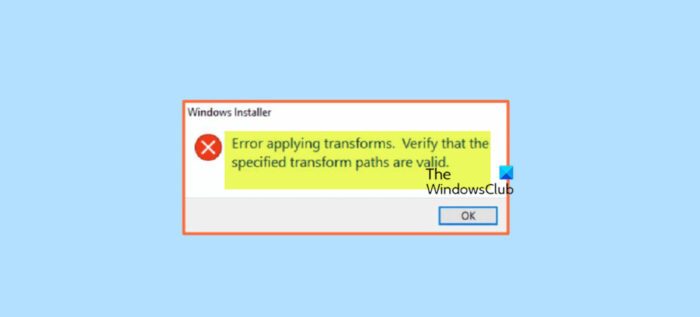
What are Transforms in Windows?
A transform is a collection of changes applied to an installation. By applying a transform to a base installation package, the installer can add or replace data in the installation database. The installer can only apply transforms during an installation.
Below are the reasons this error could occur:
- Corrupt Windows installer
- The product key or subkey issues
- Broken software update
- Windows install and update service issues
- App registry path issues
Fix Windows Installer Error Applying Transforms
If the Windows Installer prompt pops up with the text Error applying transforms when updating or installing a particular program or app on your Windows 11/10 PC, you can try our recommended solutions presented below and see if that helps you resolve the issue on your system.
- Initial checklist
- Enable/Re-register Windows Installer Service
- Run the Program Install and Uninstall Troubleshooter
- Update/Install the program in Clean Boot state
- Edit the Transforms registry value for the software
- Reinstall the software
- Perform System Restore or Reset PC
Let’s take a look at the description of the process involved concerning each of the listed solutions.
1] Initial checklist
It’s possible the security software installed on your Windows 11/10 device is interfering with or preventing programs from updating or installing. In which case, before you proceed to the solutions proper below, you can temporarily disable your antivirus and see if you can successfully update or install the program as the case may be.
In addition, some programs’ default installer downloads the required files from the internet during the installation process, and if Windows Installer fails to fetch these files, you may get the Error applying transforms. In this case, you can resolve the issue by installing the program using its offline installer package. On the other hand, if the error occurs when you run the offline installer, you can download a fresh copy of the package. You can open Task Manager, and in the Processes tab, look for and kill the task for all running msiexec.exe processes, then try the program update/install and see if that helps.
Also, due to a corrupted system file, you may encounter this error. In this case, to rule out this possibility, you can run an SFC scan which will find and fixes the problematic files on the system.
Read: Fix Java update did not complete, Error Code 1618
2] Enable/Re-register Windows Installer Service
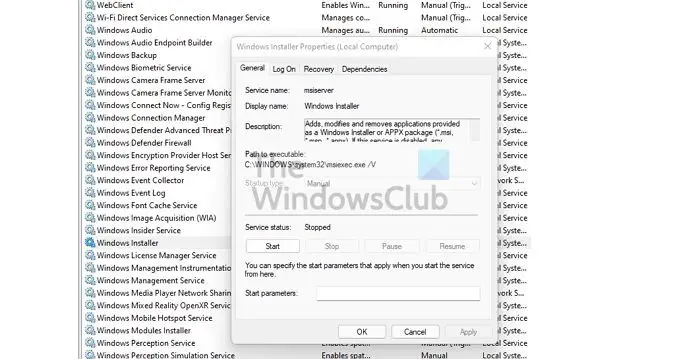
The error may occur due to a corrupt Windows installer or the Windows Installer service is not running or disabled for some reason. This service handles installing system modules from applications, so without it running, there’s a chance that essential components aren’t installed.
This solution requires you to make sure that the Windows Installer Service is enabled. To perform this task, do the following:
- Press Windows key + R to invoke the Run dialog.
- In the Run dialog box, type services.msc and hit Enter to open Services.
- In the Services window, scroll and locate the Windows Installer service.
- Double-click on the entry to edit its properties.
- In the properties window, click the drop-down on the Startup type and select Manual.
- Next, make sure the service is started by clicking Start if the button is not greyed out.
- Click Apply > OK to save changes.
- Restart PC.
However, if the service is already running but the issue persists, you can re-register Windows Installer Service. Here’s how:
Press the Windows key + R to invoke the Run dialog.
In the Run dialog box, type cmd and then press CTRL + SHIFT + ENTER to open Command Prompt in admin mode.
In the command prompt window, type the commands below and hit Enter to temporarily unregister the Windows Installer service:
%windir%\system32\msiexec.exe /unregister %windir%\system32\msiexec.exe /regserver %windir%\syswow64\msiexec.exe /unregister %windir%\syswow64\msiexec.exe /regserver
Restart your computer. On boot, see if the error reoccurs.
Read: The Windows Installer Service could not be accessed or started
3] Run the Program Install and Uninstall Troubleshooter
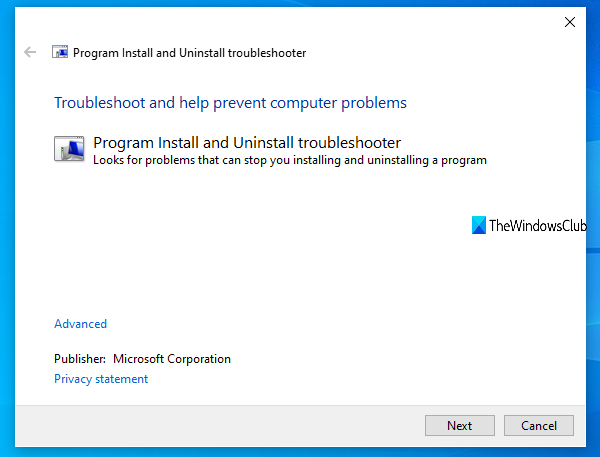
As the name implies, the Program Install and Uninstall Troubleshooter help you automatically repair issues when you’re blocked from installing or removing programs on your Windows 11/10 computer. Among other fixes, the automated utility will fix corrupted registry keys of updating data for already installed programs on your device. After you run this tool from Microsoft and the issue persists, you can try the next solution.
Read: InstallShield Error code 1722 while installing the MSI program
4] Update/Install the program in Clean Boot state
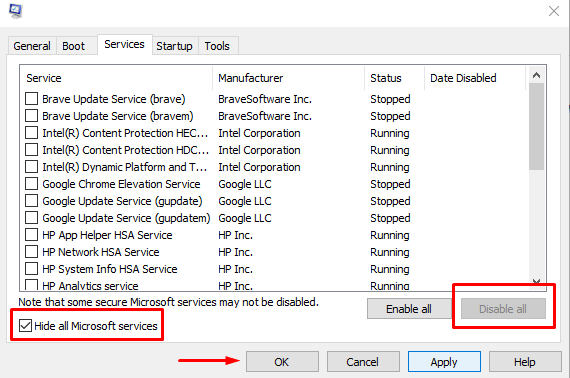
This solution requires you to perform a Clean Boot to remove any conflicts that may occur during the software update or installation. This means starting your Windows 11/10 computer with the minimum required drivers and programs and seeing if you can successfully update or install the software in that system state.
In the case of the error occurring when installing the software, it’s possible that, for some reason, the Windows 11/10 system is detecting the installer as an old program and as such, creating a conflict. In this case, you can run the package installer in Compatibility Mode on your PC in a clean boot or normal mode. To perform this task, do the following:
- Open File Explorer.
- Locate and right-click the software package executable (installer) file.
- Choose Properties.
- Navigate to the Compatibility tab.
- Now, check the Run this program in compatibility mode for option.
- Choose Windows 7 or 8 from the drop-down menu.
- Check the Run this program as an administrator option.
- Click Apply > OK.
Now, check if the issue is resolved. If not, you can run the Program Compatibility Troubleshooter and see if that resolves the issue.
Read: Error 5, Access is Denied while installing software
5] Edit the Transforms registry value for the software
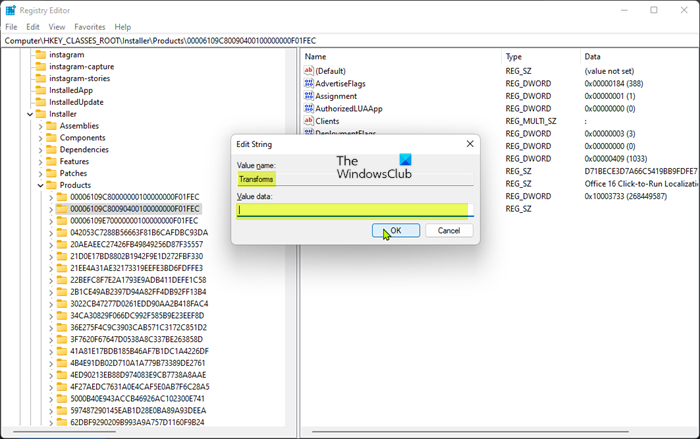
The error in view may occur when updating the installed software, due to an invalid transform registry path/value for the software. In this case, to resolve the issue, you can edit the transforms path in Windows Registry.
Since this is a registry operation, it is recommended that you back up the registry or create a system restore point as necessary precautionary measures. Once done, you can proceed as follows:
- Press the Windows key + R to invoke the Run dialog.
- In the Run dialog box, type regedit and hit Enter to open Registry Editor.
- Navigate or jump to the registry key path below:
HKEY_CLASSES_ROOT\Installer\Products
- At the location, on the left navigation pane, right-click the Products sub-parent folder.
- Select Find from the context menu.
- Now, check the Keys, Values, and Data options.
- Next, in the Find what field, type the name of the software you’re having issues with.
- Click the Find Next button or hit Enter to find the specified registry key.
- From the search result, on the right pane, double-click the Transforms registry key to edit its properties.
- In the registry key Properties dialog, delete the values in the Value data field.
- Click OK.
Note: In the case, the error appears when uninstalling a program, simply delete the Transforms registry key by right-clicking the entry and then selecting Delete from the context menu.
- Exit Registry Editor.
- Restart PC.
On boot, see if the issue is resolved. If not, you can proceed with the next solution.
Read: Cannot install or uninstall programs in Windows
6] Reinstall the software
If you get the error prompt while updating the software, it’s likely the current installation database is corrupt on your device. In this case, the most applicable fix is, that you can uninstall the software – preferably, use any free third-party Uninstaller Software to completely remove any residual files that might conflict with installing the latest version of the software on your Windows 11/10 PC.
Read: The Configuration Registry Database is Corrupt
7] Perform System Restore or Reset PC
This should be a last resort in the unlikely event none of the suggestions described above worked. You can perform System Restore to revert your system to an earlier point in time when you weren’t having issues updating or installing programs on your device. If restoring your system didn’t help either, you can simply reset Windows 11/10 to eliminate any underlying OS issues that might be the culprit.
These two troubleshooting steps are often recommended when everything else fails and you have major issues like malware infection, the system is broken or keeps crashing, new drivers, OS or app updates are not working as expected, and so on. Of the two, restore is a better alternative before you can try reset which essentially will revert your computer to the factory state, giving you a clean slate to begin afresh.
Read: System Restore Error 0x8000FFFF Catastrophic Failure
Hope this helps!
These posts might interest you:
- Fix Windows Installer Error Code 2755
- Fix Error 0xC0070652 when installing or uninstalling Programs
- Fix Microsoft Visual C++ Install Error 0x80240017
How do you verify that the transform paths are valid?
To verify the specified transform paths are valid during the uninstall of software on your Windows 11/10 computer, you need to download and run the Windows Installer Cleanup Utility on the machine you have encountered this issue.
What is the difference between MSI and MST file?
MST files are used to transform the content of an MSI package. They are often used by administrators to customize the behavior of an existing MSI file. They use the MST files and the original MSI package in their software distribution systems such as group policies. An MST file is used to collect the installation options for programs that use the Microsoft Windows Installer in a file. MSI contain information about an application divided into features and components, and every component may contain files, registry data, shortcuts, and so on.